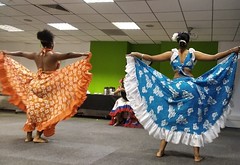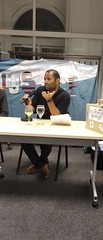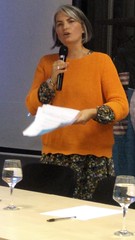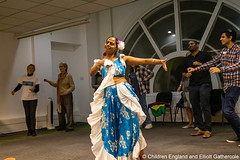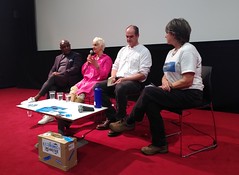‘The Long Shadow of Class’ is launched
The Long Shadow of Class was launched at Resource for London – a community organisation hub – on October 18th 2022. After watching our film, the wide-ranging audience were treated to a panel discussing the perpetuation of ‘classism’ and the necessity to involve those most affected by economic injustice in policy making.
We also launched our ‘suitcase’ of hard copy resources duplicating the stories, tactics and explainers focused on challenging economic injustice which can be found at: www.economicinjustice.org.uk
The discussion was hosted by JtoJ Chair Tania Aubeelack who then joined Cheyanne Ettienne-Chen to finish the night with a spectacular Sega. This Mauritian dance was introduced by their teacher Marie Reid – aka Samira – who explained its origins as a musical expression in response to enslavement and resistance. Thank you to Ariane Barnes who helped shape their performance.
Project Co-ordinator Abi Rhodes thanked everyone involved in creating the film: the contributors who spoke so powerfully, the director and editors at Rainbow Collective, funders and donors, the advisory group and JtoJ’s website developers at Vanishing Point Creative.
Subsequent screenings – to enthusiastic audiences in Sunderland at Pop Recs on October 20th and in Birmingham at the Midlands Art Centre on October 22nd were followed by an activity gauging whether they thought economic inequality is the fundamental inequality in the UK, with further sharing of opinions and experience.
A special thanks to our outstanding panellists – all of them contributors to the film or our Economic (In)justice project – for their moving and hard-hitting personal and professional insights.
Onwards to justice and equality!
Feedback
“I thought the launch went really well, everyone was so welcoming and very open to discussing the topic of class (which can be quite a sensitive topic). The film was very informative and relevant as ever! It’s sometimes hard to put into words how ‘class’ is still a pervasive issue in contemporary society – but the speakers/explainers were able to draw out the nuances and subtleties very well.”
(Jahura Miah, JtoJ volunteer)
e really enjoyed the launch. It’s a very important cause, now more than ever, so it’s wonderful to see so many people committed to acting on it and finding solutions.”
(Noga Flexer, local council strategist)
“I had the privilege of attending your film launch. It presents some serious talking points about the link between class and economic injustice and you could almost see the light-bulbs pinging in people’s head when they saw the obscene wealth at one end of the societal spectrum compared to the poverty faced by many, not just the jobless, but in-work poverty also. The film and wider work by Journey to Justice galvanises a desire to see fairness and equity and I really applaud the work they are doing. From a personal point of view I was delighted to see Dr Elizabeth Henry who is a real giant of racial justice campaigning. Keep up the great work.”
(Fevzi Hussein, Policy Assistant, Communications Workers Union)
“What a wonderful launch. The film is incisive, undeniable and so expertly balanced. Thank you for inviting me to be part of this hugely important resource. I would like to see it watched, discussed and used to inform far and wide.”
(Dr. Elizabeth Henry, adviser, activist, campaigner)
“I loved the film, because it was real, and included lived experience from a diverse range of people, as well as well-researched facts to give evidence. It should be shown to young people, and policy-makers and decision-makers. Well, everyone, really!”
(Jane Hatton, Director, Evenbreak)
“I felt less alone with my views about the effects of class. I know a few will be able to move [out of poverty] but for many it feels so difficult…Shahajahan summed it up when he said you think hard work is enough, but you need more… Some financial support from parents, self-belief, supporters that can point the way…”
(Deb Neville, mental health social care manager)
“The film is very current and timely for the situation (globally) we are in right now. But, I feel JtoJ can go further, especially with our mission statement. I guess what I was hoping for from the film screening/meeting that night was more talk of galvanising the people and how we can take real action for social/economic change. In my opinion it’s more important people know how to do that than be educated about the theories of how we got in this economic crisis in the first place. Yes, there was a bit about economic injustice. But ‘this is what we can actually do’ was a bit lacking for me.”
(Tamla Parris-Bah, JtoJ project participant)
“The Long Shadow of Class is a timely and important reminder of the backwards steps our society has taken and the varied ways the poorest in our country are oppressed. It would make a valuable addition to any school or university syllabus, whether that be raising awareness with students who are unfamiliar with working-class exploitation, or inspiring action from those who have survived it.”
(Rowan McCabe, poet)
“The Equality Act (2010) states that characteristics such as age, disability, gender reassignment, marriage and civil partnership, pregnancy and maternity, race, religion or belief, sex and sexual orientation, are protected from discrimination, by law. However, this film makes it apparent that this list is not exhaustive. It is evident that economic status and “social class” are hugely influential in determining how we experience life and the ways in which opportunities made available to us can become limited, reflecting the unequal access to resources and rights in society due to historically constructed barriers. The Long Shadow of Class expertly demonstrates the ways in which we embody power, and how we can deploy strategies to organise against economic injustice locally, regionally, nationally, and globally.”
(Niamh Gallagher, staff, Sunderland University)
“It was a really insightful evening at JtoJ’s Resource for London film launch. I loved the different aspects the film covered and how it delved into the impact of class differences from various perspectives. I found it really thought provoking. The film was also complemented with a great panel discussion particularly on class in relation to the education system.”
(Mahzabin Ahmed, JtoJ volunteer and civil servant at the Foreign Office)
The Long Shadow of Class is an excellent resource for those interested in transformational approaches to education. Its use of ‘real world’ research, life story narratives and academic inputs offers opportunities for discussion and moments of learning on the intersecting realities of social injustice in Britain today. The film has so many connecting stories that are deliberately made absent by the dominant political establishment.
The film offers youth workers, community workers, social workers, schoolteachers and all university and college lecturers an easily accessible resource to build an empowering dialogue and engagement that can help people build a more critical conceptual and contextual framework for understanding self in relation to society to deepen their explorations about who they are, where they came from and where they are going.’
(Dr. Rick Bowler, former Senior Lecturer, Community and Youth Work)
“The film is an important documentary which explores the intersection between class and economic injustice. Local council members and MPs should engage with it so they can recognise the issues their constituents face – particularly in light of the cost-of-living crisis – and implement changes to increase the economic health of UK districts and boroughs.”
(Charlotte-Rose Kennedy, M4C funded PhD student)
“This film will be of relevance to a wide range of audiences. The coherence of its structure and the articulate array of its talking heads and protagonists will make it vital viewing for anyone with an interest in economic justice, from school children to university students, community groups to concerned families. It simplifies often complex issues without ever becoming patronising, and begins to offer real solutions to pressing everyday issues which affect us all.”
(George Lewis, Professor of American History, University of Leicester)
“I was honoured to be asked to take part in the Journey to Justice Economic Injustice video. It is often hard to relive challenging life events, especially on camera. However, I felt it was important to show how, with certain societal structures in place, people can find a pathway out of poverty. This latest JtoJ endeavour is a vital part of educating us all about how poverty can hold people back, but how with the right support we can all be part of a fair and just society.”
(Susan Morrow, technologist, writer, and film participant)





